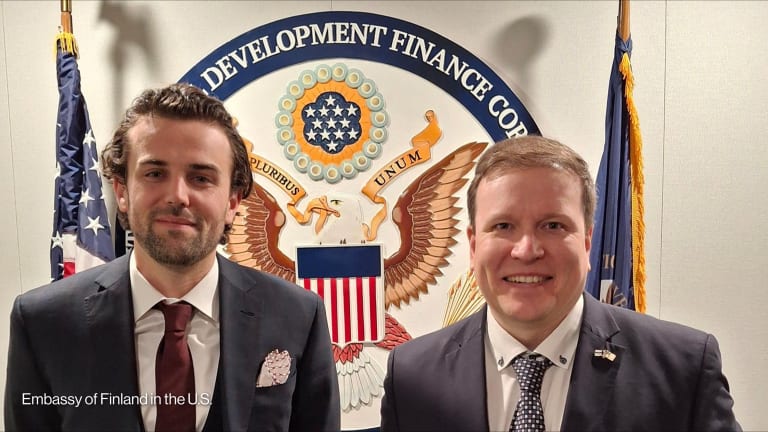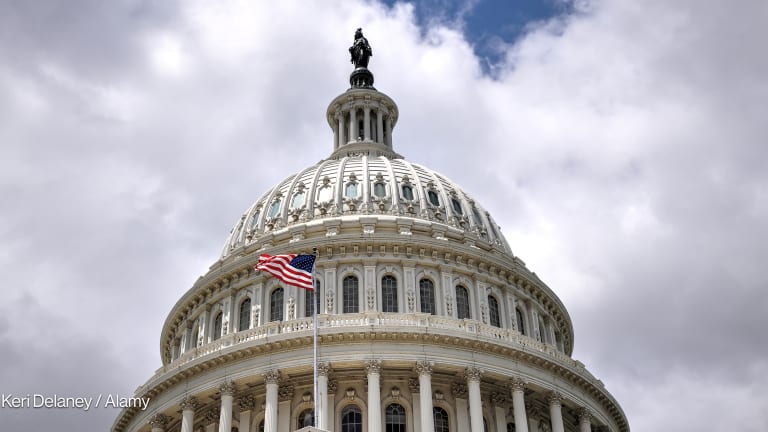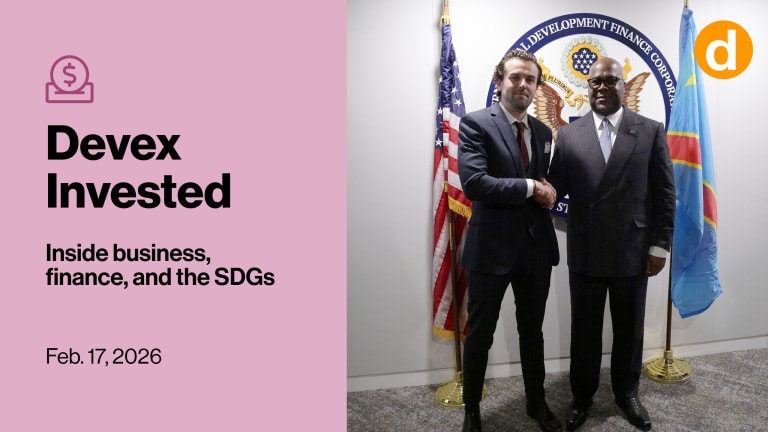Meet Andy Herscowitz, DFC's first chief development officer
The U.S. International Development Finance Corporation has its first chief development officer. Devex speaks with Andy Herscowitz about how he defines his job and what he's focused on.
WASHINGTON — When the U.S. International Development Finance Corporation was approved by Congress, a key component of the legislation was the creation of a chief development officer — a new position charged with ensuring the agency upholds its development mandate and effectively coordinates with other agencies. In February, DFC named its first CDO: Andy Herscowitz. “My goal isn't to try and find problems with deals, but it's rather to figure out how we can make sure that investments happen as quickly and as responsibly as possible.” --— Andy Herscowitz, chief development officer, DFC Herscowitz comes to the role after leading Power Africa, the U.S. government’s program to double access to electricity in Africa. He has also worked as a U.S. Agency for International Development mission director and as the attorney for USAID’s Development Credit Authority, which is now part of DFC. In an interview, Herscowitz told Devex he hopes to harness his experience with the interagency process and knowledge of how USAID works in his new position. In his first month, Herscowitz spent a lot of time analyzing the text of the Better Utilization of Investments Leading to Development Act, or the BUILD Act, which created his job, figuring out how to prioritize his office’s functions. “My goal isn't to try and find problems with deals, but it's rather to figure out how we can make sure that investments happen as quickly and as responsibly as possible and we reevaluate what risk is in certain countries,” he said. Often, people look at the perceived risk of investment in a country and dismiss the opportunity, even though others are successfully investing there, so Herscowitz is trying to better understand how the agency can move money into low-income or lower-middle-income countries “in a way that we haven’t done in the past,” he said. In March, DFC approved its first five projects, with one going to a high-income country, two to upper-middle-income countries, one to a lower-middle-income country, and one regional loan. DFC’s mandate, according to the BUILD Act, is to invest primarily in low-income and lower-middle-income countries, with some exceptions granted for national security or foreign policy reasons, though the process for determining those exceptions is somewhat unclear. DFC has committed to making sure that at least 60% of the projects it invests in — either by dollar amount or by the total number of projects — are in low-income and lower-middle-income countries, Herscowitz said. Projects totaling less than $50 million don’t have to go to the board for approval, and projects in low-income countries are likely to be for smaller projects that can then scale as markets are created, he said. “You don't just go into a small, low-income country and do a billion-dollar project if they don't have sort of a governance structure in place or the financial markets are not well developed,” Herscowitz said. DFC plans to expand its Portfolio for Impact and Innovation programs significantly and, through that, expedite lending to low- and lower-middle-income countries, according to Herscowitz. “We're going to get there. I'm not worried about that at all,” he said. DFC has a mandate to earn money, but it also needs to take risks, he said. The agency’s leverage ratio — how it’s able to use its funding to crowd in private investment — is critical, he said. “If you're going to really have a development impact, you've got to take on some risk. And if we're not taking on any risk, we're not creating; we're basically taking deals away from the private sector,” Herscowitz said. “We don't want to be doing that.” Herscowitz now has a team of about four other employees but said he is also drawing on the expertise of staff across the agency. Initially, his team is focusing on how to improve coordination with USAID, the Millennium Challenge Corporation, and other development finance institutions and development partners. A concern throughout the establishment of DFC was how the new agency would work with USAID and what cooperation would look like between the two development agencies. Herscowitz said that the relationship is moving in a good direction and that he is in regular contact with his chief counterpart at USAID, who used to be his deputy. He said he also aims to help staff at DFC understand how USAID works, including common budget constraints. “If you're going to really have a development impact, you've got to take on some risk.” --— Andy Herscowitz, chief development officer, DFC For example, in the COVID-19 response, officials from DFC and USAID are in touch daily as DFC considers how to ramp up an economic response. Herscowitz’s office is also working with USAID and the State Department to make sure that missions and embassies are trained and understand DFC’s tools. It is also exploring collaborative mechanisms that agencies can develop together, figuring out how to best use DFC’s employees abroad, and looking to boost cross-agency fellowships or staff exchanges. DFC is still working to stand up its Development Advisory Council, a task that is now under Herscowitz’s purview. He would like the council to include diverse perspectives, including business voices, and wants members to have experience working and doing business in low-income and lower-middle-income countries so they can help DFC “think about how to step up its business in those countries,” Herscowitz said. The aim is for the first Development Advisory Council meeting to be held by June, though it will likely have to be a virtual meeting, he said. One of the agency’s new authorities is the ability to provide technical assistance grants, which some thought may be managed from the CDO’s office. That capacity is not currently managed out of Herscowitz’s office, but it may be in the future if it's found to be the best place for that work, he said. Herscowitz reports to DFC’s board, but on a day-to-day basis, he reports to the CEO and is part of the executive team. It’s not yet clear if he will sit on the investment committee — that discussion is ongoing. If he does, it would mean about 60 additional meetings per year, and Herscowitz may be better served engaging earlier in the investment process, he said. DFC has been developing a new impact evaluation framework for quite some time, and while the new agency and its predecessor, the Overseas Private Investment Corporation, did a number of consultations, DFC has not yet released it publicly. The new evaluation framework will be formalized and officially approved soon, Herscowitz said, adding that he wants it to be credible and to be a tool that pushes project developers and clients to improve the development impact of potential investments. He continues to work through the impact measurement framework, but he will also look at monitoring and evaluation, which he sees as important not just for accountability but also to help the agency tell its story, Herscowitz said.
WASHINGTON — When the U.S. International Development Finance Corporation was approved by Congress, a key component of the legislation was the creation of a chief development officer — a new position charged with ensuring the agency upholds its development mandate and effectively coordinates with other agencies. In February, DFC named its first CDO: Andy Herscowitz.
Herscowitz comes to the role after leading Power Africa, the U.S. government’s program to double access to electricity in Africa. He has also worked as a U.S. Agency for International Development mission director and as the attorney for USAID’s Development Credit Authority, which is now part of DFC. In an interview, Herscowitz told Devex he hopes to harness his experience with the interagency process and knowledge of how USAID works in his new position.
In his first month, Herscowitz spent a lot of time analyzing the text of the Better Utilization of Investments Leading to Development Act, or the BUILD Act, which created his job, figuring out how to prioritize his office’s functions.
This story is forDevex Promembers
Unlock this story now with a 15-day free trial of Devex Pro.
With a Devex Pro subscription you'll get access to deeper analysis and exclusive insights from our reporters and analysts.
Start my free trialRequest a group subscription Printing articles to share with others is a breach of our terms and conditions and copyright policy. Please use the sharing options on the left side of the article. Devex Pro members may share up to 10 articles per month using the Pro share tool ( ).
Adva Saldinger is a Senior Reporter at Devex where she covers development finance, as well as U.S. foreign aid policy. Adva explores the role the private sector and private capital play in development and authors the weekly Devex Invested newsletter bringing the latest news on the role of business and finance in addressing global challenges. A journalist with more than 10 years of experience, she has worked at several newspapers in the U.S. and lived in both Ghana and South Africa.








